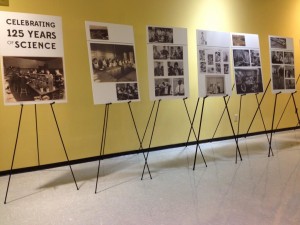WCU celebrated 125 years of science by hosting the 2014 Western Regional Science and Engineering Fair Feb. 5 and 6 and by providing a variety of activities in the Ramsey Center for young students across the region.
Feb. 5 featured the Elementary Division (grades 3-5), and Feb. 6 featured the Junior and Senior Divisions (grades 6-12).
Science departments, the Hunter Library Special Collections and the Mountain Heritage Center supplied lab equipment, curriculum materials and books for visiting teachers; and photographs, artifacts and specimens – with a large display in the lobby – to document the past 125 years of science at WCU.
In combination with honoring the past, the fair also aimed toward the future. Director of Secondary Science Education Dr. Kefyn Catley, who is also a professor at Western Carolina, decided to center this year’s fair on the theme of “Climate Change: What it means to YOU.” Both the student projects and the activities heavily involved the climate change theme.
“It was my idea based on the intense focus and impact of climate change issues. It is the single most important issue facing us today,” said Catley in an email message. “Today’s school children will be greatly impacted and they deserve to know about the issues facing the planet and what they can do to improve the situation.”
Each day started with the judges evaluating the student projects while Physical Scientist Dr. Karsten Shein from the National Oceanic and Atmospheric Administration in Asheville delivered his presentation, “From the Mountains to the Sea: What Does Climate Change Mean to Me?”
Shein began the presentation with a quote from astronomer Carl Sagan: “We live in a society exquisitely dependent on science and technology, in which hardly anyone knows anything about science and technology.”
Shein spent majority of the time exploring this concept and asking questions to audience members regarding the ways science influences our lives and is tied to each of our individual interests. Shein then went into discussing climate change and how it impacts both the ocean and the people who live in the mountains. An example that he gave of climate change affecting the mountain region is how snowstorms become less likely with rising global temperatures, but the snowstorms that do occur become more hazardous and heavy.
After the presentation, students were able to participate in a scavenger hunt prior to the science projects being open to the public for viewing. Dr. Richard Starnes, the Dean of the College of Arts and Sciences at WCU, concluded each day with an awards ceremony.
“Because of weather related school closures and delays, the number of projects were down this year, but the standard overall was higher — including some particularly creative and innovative senior projects in all subject categories,” said Catley of the fair. “I was especially delighted with the record number of environmentally focused community exhibitors that supported us this year.”
The complete list of the project winners will be posted to the science fair’s website early next week. A list of organizations that sponsored the event and handed out special awards can be seen here.




